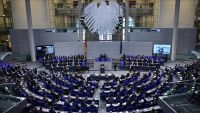Twenty-one years ago, California voters decided overwhelmingly — 59% of them — to deny public services for immigrants who came here illegally. That included refusing to educate kids.
Courts tossed out most of Proposition 187. But they couldn't throw out the sentiment behind it.
Fast-forward to a dramatic reversal in opinion.
In a new statewide poll released Wednesday night, the Public Policy Institute of California reported that the vast majority of voters now favor providing a pathway to citizenship for immigrants here illegally.
They'd need to meet certain conditions, including paying back-taxes, passing a criminal-background check, undergoing a waiting period and learning English.
Likely voters favored citizenship for these immigrants by 73% to 24%. Even 61% of Republicans favored it, although nationally GOP politicians have been the biggest obstacle to immigration reform.
All ethnic and age groups strongly supported such citizenship. So did every California region, whether blue or red.
"We've seen in our polling that people consistently see immigrants as more of a benefit to the economy than a burden. They know the importance of citizenship. And they're at the point where they just want a solution."
Republicans nationally have been dragging their feet on immigration reform, one of the blemishes on the GOP brand in California, where the Latino electorate has grown substantially since Proposition 187.
Three Republican congressmen from the immigrant-rich San Joaquin Valley — Reps. Devin Nunes of Tulare, Jeff Denham of Turlock and David Valadao of Hanford — have been fighting their party on the issue, pushing for major reform. So has the agriculture industry.
But not the valley's most powerful congressman, Majority Leader Kevin McCarthy of Bakersfield. He reflects his party's national base and opposes a comprehensive immigration bill because, his spokesman Matt Sparks recently told The Times, President Obama "cannot be entrusted to enforce the immigration laws previously enacted by Congress."
Last November, the impatient president acted on his own, through an executive order, to shelter from threatened deportation up to 5 million immigrants living in the country illegally. Roughly 1.5 million are in California.
A Texas federal judge froze the Obama program, and the case is probably headed to the U.S. Supreme Court.
In the policy institute's poll, 57% of likely voters supported the president's unilateral action. People's views of Obama played into their opinions, Baldassare said.
Overall, however, California no longer is bashing illegal immigration.
There's no broad public consensus on three other issues confronting the state, the poll found. And it's one reason the politicians often have such a tough time taking decisive action.
One polarizing issue is Gov. Jerry Brown's bullet train project.
The price tag, projected at $68 billion, is twice what voters were told when they approved the Los Angeles to San Francisco high-speed-rail line seven years ago. And the start of construction is more than two years behind schedule for a 29-mile section in the San Joaquin Valley.
Asked whether they now favor or oppose building the rail system, voters were evenly split: 48% to 48%. The biggest support was in the San Francisco Bay Area, the weakest in the Central Valley and Inland Empire.
Another issue where voters are torn is whether to spend windfall tax receipts on higher education or on paying down state debt.
The pollster noted that state government is expected to enjoy a multibillion-dollar surplus over the next several years. Voters were asked whether the extra should be used to restore university funding or to pay off debt. The response: 47% universities, 48% debt.
Voters sided with Brown in his dispute with the University of California over money. They also did in a USC Dornsife/Times poll in February.
The governor has proposed kicking in an extra $120 million next year, but only if tuition remains frozen. UC President Janet Napolitano says the university needs $100 million more than that annually or it will hike tuition 5% a year.
Asked about this in the institute's poll, 52% of voters said university funding should be increased only if tuition isn't raised. In fact, 27% said funding shouldn't be boosted in any case.
Brown and Napolitano are trying to negotiate a compromise.
One plus for Brown: His job approval remains high for a politician who has been around so long. It's at 56%.
Whether to extend Brown's "soak the rich" tax increase — Proposition 30 — when it starts to expire after next year is another issue that divides Californians.
Brown insists it was only meant as a temporary tax, as he promised. But a lot of money is involved — more than $6 billion annually — and Democrats are plotting to keep the revenue flowing.
In the poll, 48% of voters favored extending the tax; 32% even making it permanent. But 45% said let it expire. There was one unifying thought, however: 68% said the voters should decide, not the Legislature.
They still don't trust Sacramento.
But they've lightened up on illegal immigration. Maybe it's not exactly welcomed. But it's tolerated and viewed realistically.
Source: LA Times









